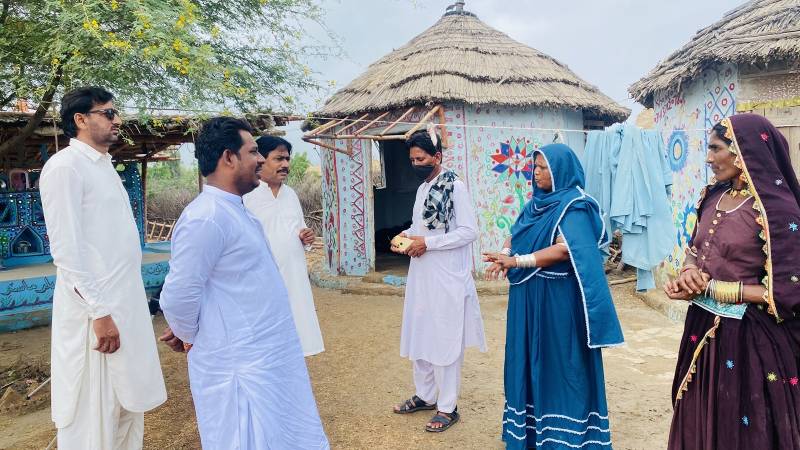
Jaama, a forty-year-old experienced cotton harvester in the village of Sain Noor Muhammad Shah in Sindh, remembers clearly the devastating flood of 2022 that destroyed their small home.
"Our mud-brick homes collapsed under the force of the floodwaters, and we faced immense hardship and tension," Jaama says, her voice heavy with the memory of those terrifying experiences. "Our lives ruined by the relentless flood, we sought refuge on the roadside with nowhere to turn. There wasn't enough food for our livestock, so they died. We struggled to get food as the days dragged into excruciating eternity, hunger gnawing at our insides. It was as though we had entered the depths of hell."
33 million people were impacted by the floods of 2022, which drowned one-third of the country. Individuals and organisations from all around Pakistan came up with various ways to help these impacted individuals. Among them was the first female architect in Pakistan, Yasmeen Lari, who started building eco-friendly and flood-proof homes. These affordable, locally sourced, and easily constructed homes are produced by the Heritage Foundation of Pakistan.
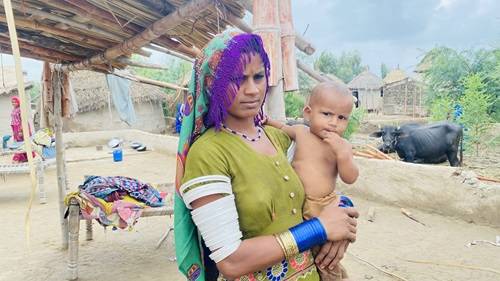
Jaama, who is now extremely satisfied and pleased after their eco-friendly homes were constructed, said, "We are really grateful to Yasmeen Lari for making these houses for us. My family and I no longer fear the rain like we did before."
Since 2005, Lari has been actively involved in addressing the aftermath of catastrophes that have plagued Pakistan, from deadly earthquakes to destructive floods. Witnessing the widespread displacement and loss of life, she resolved to focus on initiatives aimed at protecting people from such disasters in the future.
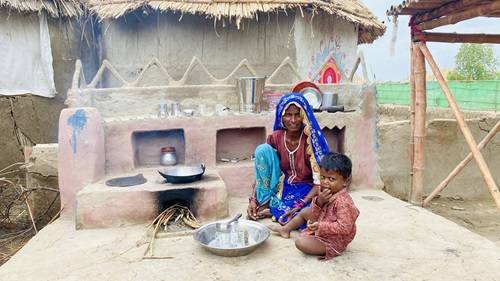
Central to her approach are eco-friendly housing solutions utilising three primary materials: earth, lime, and bamboo. "We knew we can make buildings that can be resilient. We can't control disasters, but we can make buildings that do not kill," she said. Particularly bamboo has become a a great material because of its remarkable resilience and safety features when constructed with strong connections and anchoring.
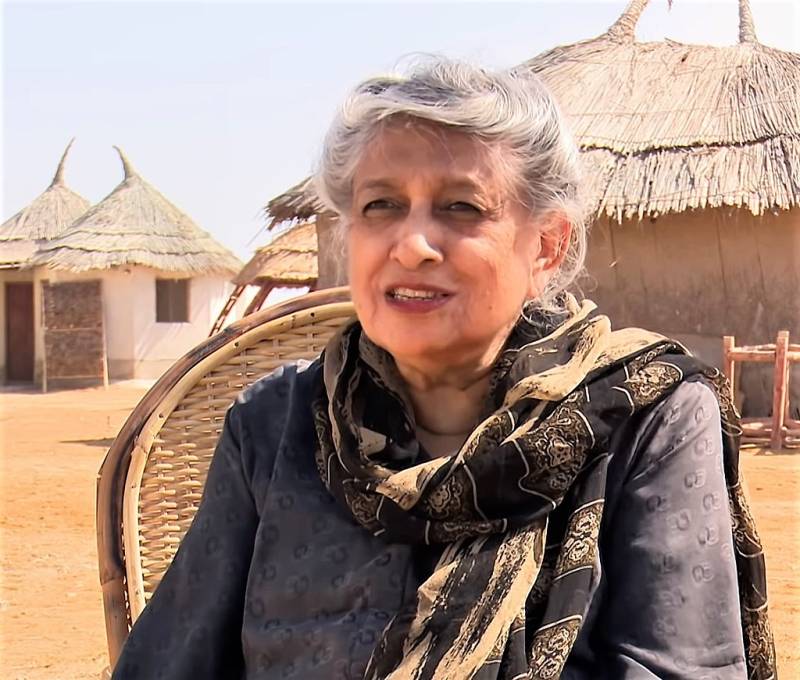
Since incorporating bamboo into her work in 2009, Lari affirms the material's resilience to earthquakes and floods. “Even in floods and earthquakes, it withstands," she says. She emphasises the significance of certain principles by highlighting significant concepts like elevating the plinth to reduce flood risk, suggesting at least a 6-inch elevation, and putting procedures in place to control water absorption and drainage.
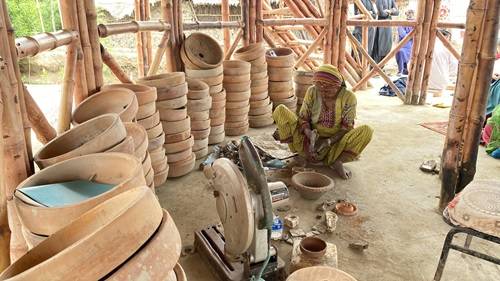
“We build a house with many precautions so it can be safe”
Families with flood-proof homes felt safe and secure during the floods – something that many others did not experience. Among them was 16-year-old Lachmi, a Poona Colony resident, who is an eighth-class- student while also running a tailoring shop.
"Our house was safe, but the villagers sought refuge on the roads," Lachmi says. "We stayed indoors because our house was already flood-proofed." While some took temporary refuge elsewhere, Lachmi and her family were safe in their resilient home.
As news of their safe haven spread, those impacted from nearby areas came to Lachmi and her family for help on how to replicate their flood-proof home. "They used to come to our home for help, and we helped them build their houses," Lachmi says. Their capacity to help came from the training they had taken on building such resilient homes.
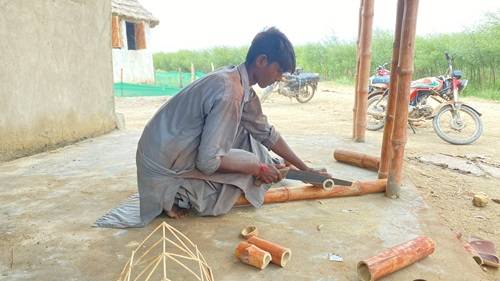
In addition to creating the eco-friendly housing solution, Lari worked to equip the local communities with the techniques and abilities necessary to build their own homes. Rejecting reliance on outside aid, she designed a system to ensure self-reliance among local populations.
Lari describes this effort as, “Just build up the capacity of the people, and they can take care of themselves,” pointing out that funds in Pakistan are being misallocated towards high-carbon structures rather than towards disaster mitigation and livelihoods.
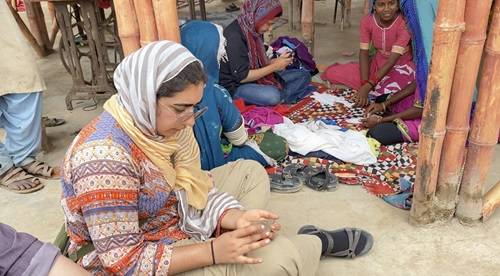
Local women and girls are teaching skills to students and researchers from Pakistan and other countries who come to the village for research on flood-proof houses (Image Credits: Jamaima Afridi)
Local people are trained how to set boundaries, organise their villages, and build Pakistani stoves for cooking under the guidance of Lari’s team. This effort has been so effective that Pakistan stoves are now a common sight in homes. They also learn how to plant vegetables and create mud bricks with the help of teams that offer practical assistance.
Hanifa, a 47-year-old who lives near Kombhar Road in Sindh, is essential to the building of eco-friendly homes since she makes a variety of things out of mud. Hanifa not only makes a living but also teaches others by using abilities inherited from her parents and learned new methods from The Heritage Foundation in Pakistan team.
“My father and mother taught me this skill. The people who helped build my house taught me some of the new designs and techniques I've lately learned,” Hanifa says.
Together with her child, Hanifa works every day, earning enough income to cover their daily needs.
Lari's comprehensive strategy from September to December 2022 intends to encourage self-sufficiency and sustainable building methods in local communities. This concept starts with ensuring food security, a crucial component that gets overlooked in traditional aid efforts, and works its way down to the most affordable yet flood-resistant structures.
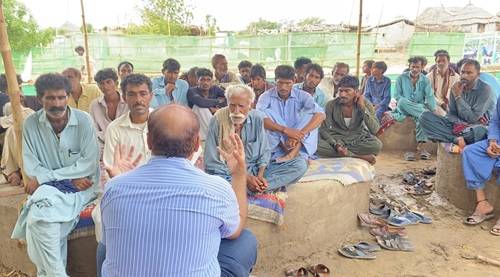
Her holistic model, piloted from September to December 2022, aims to promote sustainable construction methods and self-sufficiency among communities. However, she didn't find many takers. Consequently, they were only able to construct 5,000 units. So, she introduced the Zero Donor Model in April 2023 with the intention of rehabilitating 1 million homes by the end of 2024. This model prioritises the most cost-effective yet flood-resilient structures, beginning with ensuring food security, a fundamental aspect often overlooked in traditional aid approaches. The homes built using waste materials in the Zero Donor Model cost under PKR 6,500 around $24. The bamboo structures are approximately PKR 25,000 around $90. The bamboo model has become very popular because of its strength. But because of limited funds, the masonry structure is working pretty well, it’s got a bamboo roof, its locally fabricated, with local techniques.
Lari emphasises the importance of empowering communities to take charge of their own development. Her expertise as an architect is in offering holistic design concepts that include food security, sanitation, housing, and flood mitigation strategies so that communities can build their own sustainable homes.
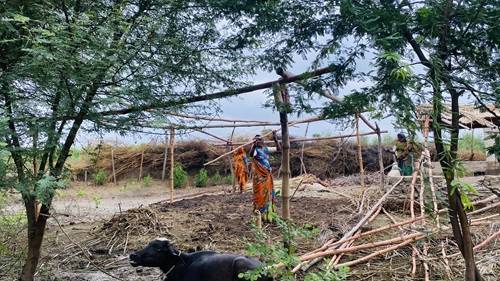
"Despite all of the foreign aid coming in, what I refer to as the colonial charity model is doing absolutely no good. Thus, we ought to either revise it or give up. At that point, I rely on people. That means how to increase their ability to perform tasks. As an architect, it is my responsibility to provide them with a complete design concept that provides a better living and environment as well as a more comprehensive solution."
Despite financial constraints, Yasmeen Lari's Zero Donor model has already benefited over 350,000 families in 4,000 villages, providing food security and using locally available resources to keep costs minimal.

